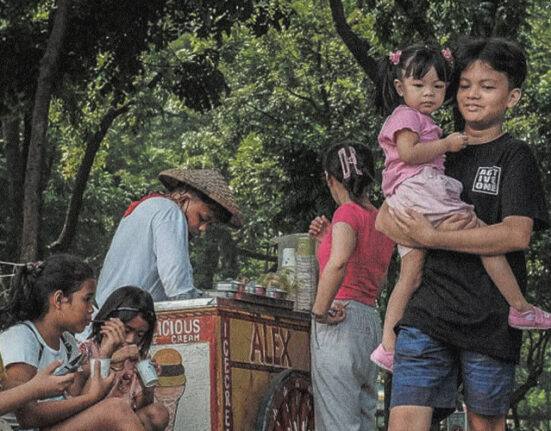“Gusto ko sabihin sa sarili ko, salamat kasi hindi ka sumuko sa hamon ng buhay. Hindi palaging okay pero okay lang ‘yun, ang mahalaga may nasimulan na. Malayo pa sa gustong pangarap pero malayo na sa dating buhay mo ngayon.” —Jerome.
IT is said that the panganay—the eldest child in a Filipino family—carries significant obligations.
When their parents are not around, they often immediately assume the role of a second parent to their siblings. They are assigned to cook delicious meals, do the laundry and iron clothes, pay the bills, and manage the budget for their allowance. More often, their responsibilities as role models go beyond the confines of their home. Instead, it encompasses much more significant duties.
If you are the eldest child, there is an expectation to support the family like there is an unspoken agreement they have signed with the world with their little fists and innocent eyes that places them in a leadership role because they are the future leaders of their pack. Destined to carry the family by name with pride or financially, no matter what it takes.
The Panganay Culture in the Philippines
The Panganay Culture in Filipino tradition is characterized by the eldest sibling’s strong sense of obligation, frequently taking on the role of a secondary guardian—shouldering family responsibilities, sometimes putting aside personal aspirations, and acting as a source of strength for younger siblings and parents.
Panganays are often perceived as the strongest siblings—the foundation. The sandalan, kumbaga. Elders are the wisest and are in charge of putting siblings together. Ate and Kuya build and fix, work and provide, council and advise, and should be the one-call-away type of sibling. When the younger ones fall short, they are expected to show up and catch them.
But, what about Ate and Kuya when they are drained and weakened—when the shoulders that once offered support begin to tire, and the hands that once provided comfort start to tremble with exhaustion? Who will be there to welcome them if their knees grow weak and the balance of their feet slowly gives away?
To be a Filipino panganay is to grow up fast
Growing up feels like you are in a time-lapse, or as fast as riding a train.
Learning how to be independent looks like a job. While you watch your neighbors playing outside, laughing, and experiencing fun childhood, there you are—learning how to properly babysit your younger brother. Learning how to make milk, and wash their baby clothes. Entertaining them with silly antics just to prevent them from their loud cries, almost deafening to your little ears. Carrying your youngest sibling in your arms while your eyes linger on the carefree laughter of your childhood friends echoing from the outside, a sound that now feels distant and unfamiliar.
But now that you’re older, you carry a different burden. You are no longer just a little kid playing with your sibling while your mother and father are away. Because now, you’re one of those who are playing the game of life. Turns out, it is not tumbang-preso that you yearn for, it is not tagu-taguan you’ve been wanting to play. But rather a break from the tiring and exhausting responsibilities.
Dahil tunay nga pala talaga na…
To be a Filipino panganay is to make countless sacrifices because you love deeply
The love that the eldest siblings hold runs too deep—like a root of a tree, that no matter how many storms and struggles they encounter, they will always find their way to climb out of sharp rocks—continues to creep in and strengthen, driven by their unyielding love. Even if it means wounds and thorns, even if it equates to a jar of tears.
A type of love that could surpass anything, as long as they have their family with them.
In my search, I met 26-year-old Jerome Salonoy—the eldest among three children. An elder brother who bravely endures the harsh blows of life, just to keep his family afloat.
“Nagstart ‘yung pagpo-provide ko sa family ko ay 2022, noong time na umalis si Daddy sa bahay. Ako nagpapaaral sa dalawa kong kapatid, nagbabayad ng bills at bahay kasama na din ‘yung mga groceries and basic goods ng family ko hanggang ngayon.” Jerome started to provide for his family at the age of 23—still young to think about, but old enough to take on the role of a father.
Though still finding his footing in supporting his family alone, Jerome pressed on and never lost hope.
“Ang dami kong naging utang noon kasi hindi naman kaya ng sahod ko lahat ng mga dapat kong bayaran. Pangalawa, nung time na na-hospital si Mommy, tuition ng kapatid ko.”
Just when he thought he had faced enough problems, they were suddenly evicted from the house they were renting, adding to the pile of his dilemmas. Even his personal needs became a struggle as well. Because of that, he could no longer prioritize himself, constantly holding back his personal necessities for the sake of his family as he was consistently preparing for unexpected emergencies.
There is no room for selfishness, but there is plenty for selflessness, that is what life taught Jerome. Everything he does is for his family. Because to be a Filipino panganay is to be reminded at all times that the family’s needs will always come first before yours. You might be born first, but your needs always come last—for your family will always be a priority of yours.
“Gusto ko magpahinga pero sayang pa kasi ‘yung mawawala na kita. ‘Pag day off naman hindi ko din nagagawa kasi sa bahay naman ako nag-aabyad.” According to Jerome, he also took some side hustles before to add to his savings, but he could no longer continue it due to the overwhelming responsibilities and duties he had to attend to as an older brother and as a son.
“Mahirap kasi ‘yung problema naming mga panganay. Kailangan namin gawing maliit sa amin para hindi kami ma-drain. May mga oras na hindi mo masabi lahat ng nararamdaman mo sa pamilya mo. Wala kaming back-up kapag kami ay nanghina. Ang tanging choice lang namin ay maging matatag sa kahit na ano mang sitwasyon.”
There is no such thing as back-up, for it is him—Jerome. There is no one else to man up and catch his family, other than him—the Kuya of the household. Perhaps, the greatest lesson he could mutter is that, to be a Filipino panganay is to run to no one while everyone expects you to be open arms for them.
That when the time comes where pains and sorrows are in a whirlwind, when your life screams melancholy you will be reminded that being a panganay is a tough job. Parents couldn’t understand, friends are nowhere to be found, and the only thing present is a bottle of alcohol inside your refrigerator. The bills are peeking, waiting for you to open them all.
Their greatest sacrifice is none other than themselves
Despite the countless hardships he faced, Jerome shared his proudest achievement with a smile—not just being able to provide for his family, but making his sibling graduate from college. For him, this is among his most significant accomplishments as an older brother. To see his younger sibling walk with a black toga, receiving his diploma. A paper that does not only contain a certificate of his sibling’s perseverance but a symbol of his incomparable love and his sacrifices.
On the other hand, if there’s one thing that 22-year-old Sophia Garcia is determined to prove, it is that she can graduate on time as a criminology student. Sophia’s burden as the eldest of six children is the heavy responsibility of finishing college without disappointing her family. The early pregnancy of her relatives adds to the pressure, pushing her to prove that she is different.
“…na hindi ako tutulad sa mga pinsan ko, gusto kong makatapos para makatulong sa pamilya at mapag-aral ang mga kapatid kong bunso sa akin. Kaya naman ginagawa ko ang lahat sa abot ng aking makakaya,” Sophia shared.
While Jerome is the one supporting his sibling’s education, Sophia, on the other hand, is being sent to school by her second sibling.
“Tumigil muna siya sa pag-aaral upang makatulong sa mga magulang ko at may maipangtustos sa pang araw-araw na pamumuhay. Para rin matulungan kami ng mga kapatid ko sa pag-aaral,” she continued. Despite the constant struggles of pursuing her chosen program, it was instilled to Sophia that she will have her degree earned as she is strongly determined to cut their family’s cycle.
Overwhelmed by pressure, the 22-year-old seems to have forgotten about her youth—to explore and experience love. Something normal for someone Sophia’s age.
“Focus ako sa pag-aaral. Ngayon kasi ay graduating na ako at OJT rin. Naiisantabi ko ang pag-ibig na ‘yan dahil naniniwala akong may tamang panahon siguro para d’yan,” she confidently explained. And in just a few months more, Sophia will finally achieve her long-awaited goal—graduating from college, a dream she shared with her siblings and parents.
Sophia is the mirror of millions of daughters who fight their silent battles everyday. Her story might sound shallow on the surface, but Sophia speaks of the pressure to be indifferent while everyone follows the same footsteps. Afraid to end up in the same station, motivated to change the narrative that scarred her perspectives and shaped her dreams.
Sophia is the eldest and will be the change her family is waiting for.
Oftentimes, being a Filipino panganay means shouldering everything. To clear the path for other people to walk in, even if it means losing yours in the process. And while everyone knows you have them and they have you to run to. When everything else starts to shatter, you will realize that all you have is yourself in a dark corner of your room, mourning for the lost childhood as you drown in adulthood and in an endless cycle of responsibilities.
No matter how different the homes we come from, no matter how varied the upbringing we have experienced, sometimes, only one voice can be heard from the eldest siblings of the family—a voice of sacrifice, resilience, and unspoken longing.
Their stories are one of a kind. Like a coffee caught between sweetness and bitterness. Behind their every happy smile and embrace hides small kids watching themselves grow as fast as the day goes by. As they kneel down on the floor to pick up the broken glass, they bleed together with their dreams for their siblings. Pouring their last drop of strength, serving their remaining patience with trembling hands—silently hoping that someday, someone will offer them a cup of their own.
With reports from Ivory Jade Q. Guizon
How useful was this post?
Click on a star to rate it!
Average rating 5 / 5. Vote count: 9
No votes so far! Be the first to rate this post.
We are sorry that this post was not useful for you!
Let us improve this post!
Tell us how we can improve this post?







